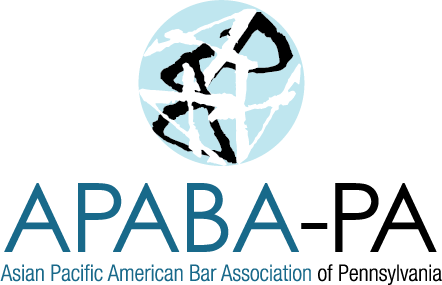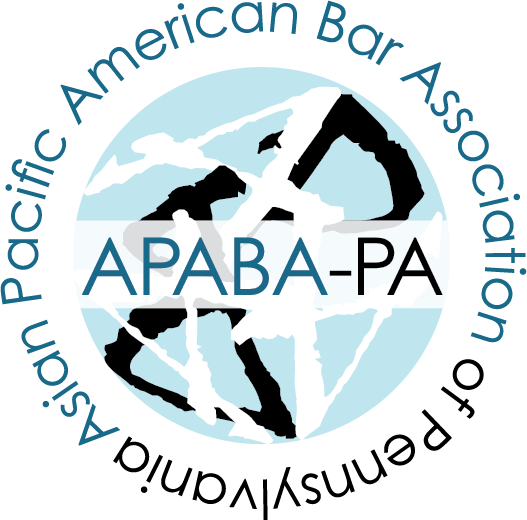APABA-PA’s Affidavit of Support on Behalf of Immigrants
RE: CIS No. 2655-20; DHS Docket No. USCIS-2019-0023; RIN: 1615-AC39: Comments in Response to Proposed Rulemaking: Affidavit of Support on Behalf of Immigrants.
The Asian Pacific American Bar Association of Pennsylvania (“APABA-PA”) strongly opposes the Department of Homeland Security’s (“DHS”) Notice of Proposed Rulemaking (“NPRM”), “Affidavit of Support on Behalf of Immigrants” (“Proposed Rule”), which was published in the Federal Register on October 2, 2020, with a short deadline for comment of today, November 2, 2020. APABA-PA urges DHS to withdraw the Proposed Rule in its entirety. If implemented, the new rule would increase costs; cause confusion, delays, and fear; and ultimately deter sponsors from supporting family members’ path to a green card. This proposed policy clashes with our country’s commitment to prioritizing family reunification and providing a pathway to lawful permanent residency and citizenship.
APABA-PA, formerly the Asian American Bar Association of the Delaware Valley, is a non-profit organization founded in 1984 to serve a wide network of Asian Pacific American (“APA”) attorneys admitted or practicing in Pennsylvania, Northern Delaware, and Southern New Jersey. APABA-PA is dedicated to the advancement of APA attorneys and to promote justice, equity, and legal access, especially for all APA communities. Among our membership, APABA-PA attorneys practice in many areas of law, including but not limited to immigration law and public benefits law.
The Proposed Rule would make it harder for Americans to sponsor immigrant family members and thus make it more difficult for immigrants to obtain green cards and, ultimately, citizenship. It would impose new and unnecessary evidentiary burdens by requiring sponsors and household members to submit extensive and intrusive financial documentation, such as tax returns, credit reports, credit scores, and bank account information. It would also mandate that sponsors secure a co-sponsor if they used a means-tested public benefit within the last three (3) years, or if they failed to meet a prior sponsor obligation, regardless of their financial assets in the present, and limit the members of the sponsor’s household who could sign onto the Affidavit of Support with them. This new provision linked to the use of public benefits of the sponsor will deter both immigrants and U.S. citizens from using benefits for which they are eligible, for fear that it will adversely impact their ability to sponsor an immigrant in the future. Thus, this Proposed Rule would have particularly harmful consequences for individuals, including U.S. citizens and U.S. permanent residents, with a current need to utilize public benefits for which they are lawfully eligible, such as important healthcare and nutrition benefits, in fear that such use will in the future negatively affect their ability to sponsor an immigrant.
The Proposed Rule to significantly expand the Affidavit of Support requirements will have a dramatic impact on racial minorities, many of which are APA families, by preventing certain immigrants from entering the country or obtaining lawful permanent resident (“LPR”) status. APAs are among the fastest growing populations in the U.S., in large part due to changes in U.S. immigration law in the 1960s that repealed restrictions on immigration dating back to the Chinese Exclusion Act of 1882.[1] In recent years, more than 31 percent of new LPRs have come from Asian and Pacific Island nations.[2]
The Proposed Rule would disproportionately impact the fast-growing population of APAs in Pennsylvania. In 2016, 27,217 individuals in Pennsylvania became LPRs, putting Pennsylvania among the top twelve (12) states with the greatest number of individuals who received a green card.[3] The number of individuals in Pennsylvania who became LPRs in 2016 was greater than in 2015 and even greater than in 2014, demonstrating an increase over the past several years.[4] Between 2012 and 2016, the APA population in Pennsylvania grew by nearly 54,000 residents (i.e., a 14.6 percent growth rate), which was faster than Pennsylvania’s overall population and the overall U.S. population.[5] Hence, this new rule would disproportionately impact the fast-growing population of APAs in the country, located here in Pennsylvania.
The Proposed Rule would require a sponsor who received a means-tested public benefit – including Medicaid, CHIP, SNAP, SSI, and TANF – within the past three (3) years to obtain a joint sponsor, regardless of the sponsor’s present income. This proposed restriction is additionally concerning because of the significant variation in average income among the dozens of APA ethnic groups. With the exception of the South Asian population, all other groups within the APA community (i.e., Southeast Asian, East Asian, Native Hawaiian/Pacific Islander) in Pennsylvania have poverty rates that exceed the rest of the state.[6] It is notable that 17,200 APAs who are not yet U.S. citizens are members of families who rely on SNAP to put food on the table.[7] If implemented, the rule would deter potential future I-864 sponsors from playing a critical role that permits family members and close contacts to become LPRs, ultimately reducing the number of immigrants who are able to apply for and become LPRs.
The Proposed Rule also creates additional administrative burdens on U.S. Citizenship and Immigration Services as well as Department of State visa officers applying Form I-864 to immigrant visa applications, requiring adjudicators to collect and evaluate additional financial and public benefits use information not required under the existing rule, without positive benefit except to make it more difficult and cumbersome to establish the financial status of a U.S. citizen or U.S. permanent resident sponsor. The rapid introduction of this additional burden, increasing the documentation requirements for sponsors, will create confusion and require comprehensive training of adjudicators to apply the rule even-handedly, in a system that is already beset with absurdly long processing times and unexplained delays.
Accordingly, APABA-PA strongly opposes the proposed rule to amend its regulations governing the affidavit of support requirements and urges DHS to reject all of the changes proposed in its Notice of Proposed Rulemaking and withdraw the Proposed Rule in its entirety.
Sincerely,
Djung Tran, Esq.
2020 President, APABA-PA
[1] Department of Homeland Security, Yearbook of Immigration Statistics 2016, https://www.dhs.gov/immigration-statistics/yearbook/2016.
[2] Department of Homeland Security, Yearbook of Immigration Statistics 2016, https://www.dhs.gov/immigration-statistics/yearbook/2016/table3.
[3] Department of Homeland Security, Yearbook of Immigration Statistics 2016, https://www.dhs.gov/immigration-statistics/yearbook/2016/table4.
[4] Id.
[5] Assessing the Asian American and Pacific Islander Population in Pennsylvania, https://www.governor.pa.gov/wp-content/uploads/2018/10/20181018-Assessing-AAPI-Population-PA.pdf.
[6] Assessing the Asian American and Pacific Islander Population in Pennsylvania, https://www.governor.pa.gov/wp-content/uploads/2018/10/20181018-Assessing-AAPI-Population-PA.pdf, at 16.
[7] Estimates of Means-Tested Public Benefit Use by U.S. Citizenship Status: Total, Asian American and Pacific Islander (AAPI), and Hispanic Populations, 2014-16, https://www.migrationpolicy.org/sites/default/files/datahub/PublicCharge-StateEstimates.xlsx.
Full Letter Here.
- On November 12, 2020

